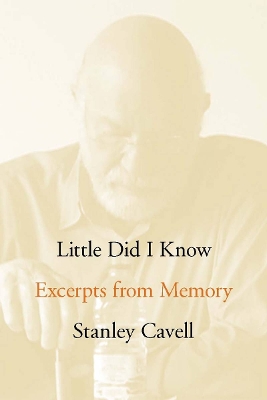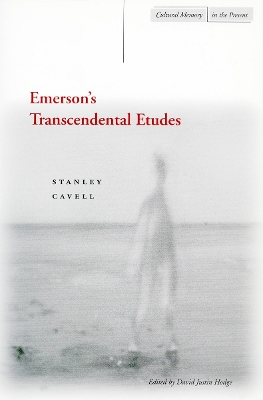Cultural Memory in the Present
2 total works
An autobiography in the form of a philosophical diary, Little Did I Know's underlying motive is to describe the events of a life that produced the kind of writing associated with Stanley Cavell's name. Cavell recounts his journey from early childhood in Atlanta, Georgia, through musical studies at UC Berkeley and Julliard, his subsequent veering off into philosophy at UCLA, his Ph.D. studies at Harvard, and his half century of teaching. Influential people from various fields figure prominently or in passing over the course of this memoir. J.L. Austin, Ernest Bloch, Roger Sessions, Thomas Kuhn, Robert Lowell, Rogers Albritton, Seymour Shifrin, John Rawls, Bernard Williams, W. V. O. Quine, and Jacques Derrida are no longer with us; but Cavell also pays homage to the living: Michael Fried, John Harbison, Rose Mary Harbison, Kurt Fischer, Milton Babbitt, Thompson Clarke, John Hollander, Hilary Putnam, Sandra Laugier, Belle Randall, and Terrence Malick. The drift of his narrative also registers the decisiveness of the relatively unknown and the purely accidental. Cavell's life has produced a trail of some eighteen published books that range from treatments of individual writers like Wittgenstein, Austin, Emerson, Thoreau, Heidegger, Shakespeare, and Beckett to studies in aesthetics, epistemology, moral and political philosophy, cinema, opera, and religion.
This book is Stanley Cavell’s definitive expression on Emerson. Over the past thirty years, Cavell has demonstrated that he is the most emphatic and provocative philosophical critic of Emerson that America has yet known. The sustained effort of that labor is drawn together here for the first time into a single volume, which also contains two previously unpublished essays and an introduction by Cavell that reflects on this book and the history of its emergence.
Students and scholars working in philosophy, literature, American studies, history, film studies, and political theory can now more easily access Cavell’s luminous and enduring work on Emerson. Such engagement should be further complemented by extensive indices and annotations. If we are still in doubt whether America has expressed itself philosophically, there is perhaps no better space for inquiry than reading Cavell reading Emerson.

